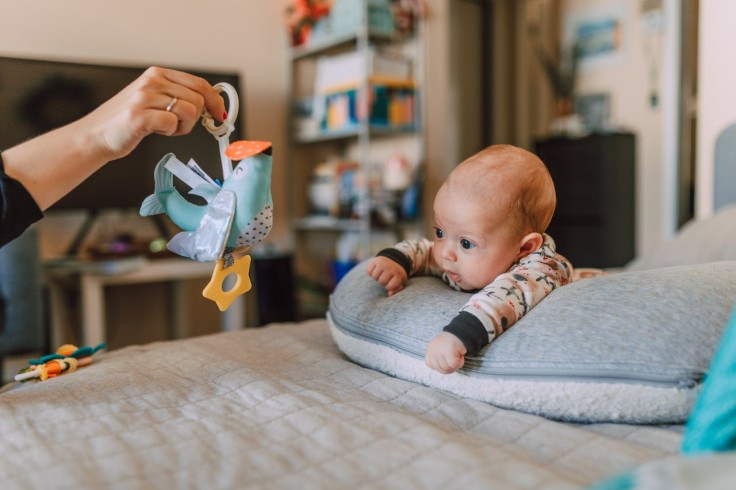
Parents usually have two modes when they are with their babies. They are either in the "activity director" mode or in the "checked out" mode.
When parents are in the activity-director mode, they are engaged and animated-singing the ABCs or the current nursery rhyme the baby enjoys, reading a book, or leading the activity. They are deciding what song to sing, what game to play, or what activity to do while happily engaging with the baby.
On the other hand, the checked-out mode is when the baby is happily playing on their own, and the parents are taking their much-needed rest or break.
Yet, there is a third mode, and this mode gives huge benefits for the baby and eventually for the parents.
Vered Benhorin, a mother of three, music therapist, and psychotherapist who has helped parents connect to their babies for almost a decade, shared that the moment she discovered this third mode, she felt so much more connected to her baby and "in tune with his behavior." Surprisingly, the third mode was relaxing for her too. Both parent and baby were in a peaceful mood, which felt so good as a parent.
'Explorer State'
Parents often think that they need to be the teachers for their babies, teaching them and showing them the world and everything in it. But here is a fact-babies already know how to investigate. It is natural to them. What parents need to do is assist them with "their research."
Babies are like scientists in nature, constantly exploring their surroundings and discovering new things for themselves. They pick up a toy or an item and feel the texture and the weight with their hands. Eventually, they will place the item in their mouth to examine it deeply. Babies are intuitively explorers, and when they are in their explorer mode, they are entirely in the moment with all their curiosity and inquiry.
Benhorin calls the third mode the "Explorer State." The parents don't lead in this mode, but the babies do. She further described this mode as the "middle ground," where parents are neither actively leading nor checking out but are followers of what the babies would like to do.
"Explorer State" is when the parents are experiencing the world through their baby's eyes, going along with them as they discover, investigate and explore something new. Parents and babies are going through a journey together where they know they are not alone in their exploration. The parents are actively discovering more about their baby, actively paying attention, and fully engaged with what their babies are doing.
Read Also: 35 Things New Moms Should Know About Breastfeeding
How to do it?
This three-minute activity gives off peace and results in a stronger, boosted connection between parent and baby. Benhorin expressed that the moments created by the third mode are just "pure magic."
This approach is under the Resources for Infant Educators or RIE (pronounced as "wry"), founded by Magda Gerber, an early childhood educator in the U.S. known for teaching parents and caregivers how to understand babies from birth and interact with these little ones.
The foundation of the Explorer State was based on what Gerber once said, "An infant always learns. The less we interfere with the infant's natural process of learning, the more we can observe how much infants learn all the time."
Thus, Explorer State focuses more on observing the babies and not interfering with them. Here's how Benhorin does it:
1. For three minutes, parents should put aside their phones or anything that might distract them from doing the activity.
2. Play soothing music. This is optional, but Benhorin realized that music helps her from getting out of her "thinking self" and into her "sensing self."
3. Parents must lie next to their babies, with their heads close to theirs.
4. Give them a toy to hold, or if they cannot grasp things yet, have something in front of them without manipulating it.
5. And now, it is time for parents to observe and notice-what is the baby looking at, what part of the toy they are exploring, what specific part did they put in their mouth, are they checking out the colors and shapes, or are their eyes wandering away from the toy given, and if yes, where are their eyes going?
As parents get into this third mode, they should let go of their "activity-director" role and allow themselves to be led by their babies instead. Go with the flow and enjoy.
Related Article: How to Nurture Your Parent-Child Bond